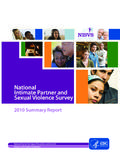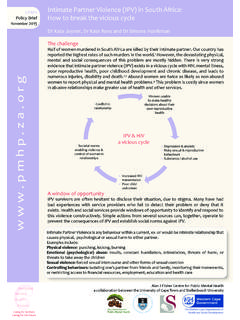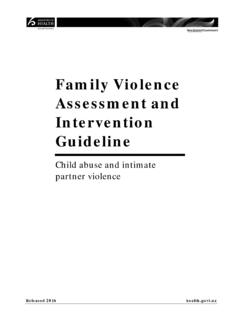Transcription of Gender Based Violence Research Methodologies in ...
1 Gender Based Violence Research Methodologies in Humanitarian Settings An Evidence Review and RecommendationsMazeda Hossain and Alys McAlpine Suggested citation: Mazeda Hossain and Alys McAlpine. Gender Based Violence Research Methodologies in Humanitarian Settings: An Evidence Review and Recommendations. Elhra: Cardif f. August 2017. About the authors: Dr Mazeda Hossain is an Assistant Professor of Social Epidemiology at the Gender Violence & Health Centre at the London School of Hygiene & Tropical Alys McAlpine is a Research Fellow at the Gender Violence & Health Centre at the London School of Hygiene & Tropical review was commissioned by Elrha s Research for Health in Humanitarian Crises (R 2HC) programme to provide guidance to Research applicants.
2 The R 2HC programme aims to improve health outcomes by strengthening the evidence base for public health inter ventions in humanitarian crises. The Save the Children Fund 2017 This work is licensed under Creative Commons Attribution NonCommercial-NoDerivatives International(CC BY-NC-ND )ISBN: 978-1-84187-132-5 Designed by Ross RedmanABBREVIATIONS ACASI Audio Computer-Assisted Self-Interview GBV Gender Based ViolenceHIC High-Income CountriesIASC Inter-Agency Standing CommitteeIDP Internally Displaced PersonIPV intimate partner ViolenceKAP Knowledge Attitude PracticeLGBTI Lesbian, Gay, Bisexual, Transgender.
3 And/or IntersexLMIC Low and Middle-Income CountriesLQAS Lot Quality Assurance SamplingNPV Non- partner ViolencePAR Participatory Action ResearchR2HC Research for Health in Humanitarian CrisesRDS Respondent Driven SamplingSRH sexual Reproductive HealthSV sexual ViolenceUNHCR United Nations High Commissioner for RefugeesVAWG Violence Against Women and GirlsVSLA Village Savings and Loan AssociationsWHO World Health OrganizationR2HC is funded equally by:54KE Y FINDINGSKey findings from a review of evidence gaps identify a need for: Timely and accurate prevalence data which includes context-specific information such as perpetrator types, conflict stage and setting type to ensure appropriate prioritisation for programming, policies, funding and Research .
4 However, prevalence data is not necessar y to develop programming and is considered a later-stage priority in GBV Research in humanitarian settings. Standardised definitions and measurement tools for researching specific forms of GBV that allow for comparability within and across settings. Increased evidence on how different types of GBV manifest in various stages of humanitarian crises. This includes a need for improved evidence on the associations between conflict and the prevalence of GBV and how conflict may influence other forms of GBV beyond physical and sexual Violence (such as harmful practices, forced marriage, economic abuse, and psychological abuse).
5 Increased evidence on health and other service needs for GBV survivors in humanitarian settings, as well as knowledge on barriers and facilitators to accessing clinical management of rape services for all sexual assault survivors, including male survivors. Increased evidence on the barriers and facilitators for women and girls in accessing GBV response services ( , threats of Violence from the community for reporting, distance and costs). Improved evidence on the ef fectiveness, operational constraints, costs, sustainability and scalability of GBV-targeted inter ventions for prevention and response throughout all crisis stages in dif ferent contexts.
6 Routine sharing of innovative and adaptable methodological approaches to overcome contextual and logistical constraints to GBV Research in challenging settings. Key findings from a systematic review of GBV Research evaluation Methodologies used in humanitarian settings highlighted: Compared to Research conducted in more stable settings, GBV-related Research is lacking in humanitarian settings. There is an oppor tunity to address the evidence gaps in understanding GBV across the humanitarian sector. Rigorous and ethical impact study designs ( , RCTs, stepped wedge) are possible, especially when strong logistical and local Research support is available.
7 The availability of GBV psychological and medical support is also crucial. There are no restrictions on the type of Research design suitable for GBV Research , provided the methodology chosen is appropriate for the Research question. In more fragile and acute crisis settings, where logistics such as complex safety and security coordination issues must take priority, or where there are limitations on access to study sites or populations, it may be difficult to apply the same rigour used in stable settings. prevalence Research is therefore not always considered a priority in humanitarian crises, but other forms of Research may be used to fill gaps in understanding.
8 It is recommend that Research related to GBV programming should always proceed even in settings where there is a dearth of data (in line with the IASC GBV Guidelines). Definitions of different types of GBV var y by study and Research aim. Therefore, Research proposals should clearly state how Violence and aggregate measures ( , sexual and physical Violence ) are defined, including details such as the type of Violence , type and sex of perpetrators, and time period in relation to a crisis. Where ethically and logically feasible, the researcher should include GBV incidence levels and related risk factors for any Research in a humanitarian setting.
9 Although most Research on GBV will focus on women and girls as that is the demographic that GBV programmes serve, when specific types of Violence are being explored ( sexual Violence ), and where ethically and logistically feasible, researchers should tr y to collect comparable data between females and males on: Violence , physical and mental health outcomes, and associated risk factors. Comparable data can assist researchers to better understand the differential impact of conflict and disaster on health and how specific forms of Violence affect females and males.
10 Few of the studies included in the review were published in the peer-reviewed literature. Whenever possible, researchers should aim to publish findings in open access journals alongside non-technical briefs so that they are widely available to researchers, practitioners, policy-makers and funders. Most of the included grey literature studies reflected wide variations in reporting details suggesting a need to develop standardised repor ting templates for inter ventions and evaluations across all published Research . Strong collaborations between Research organisations and local Research par tners are of ten the key to successful Research projects.








